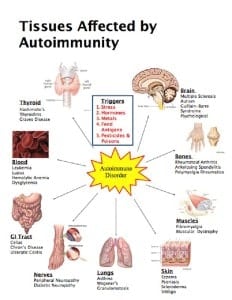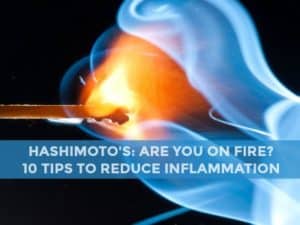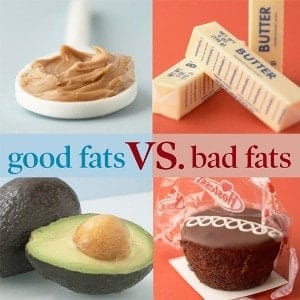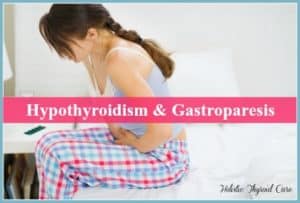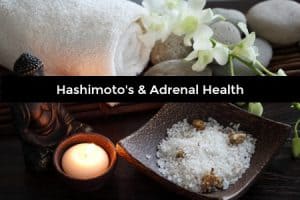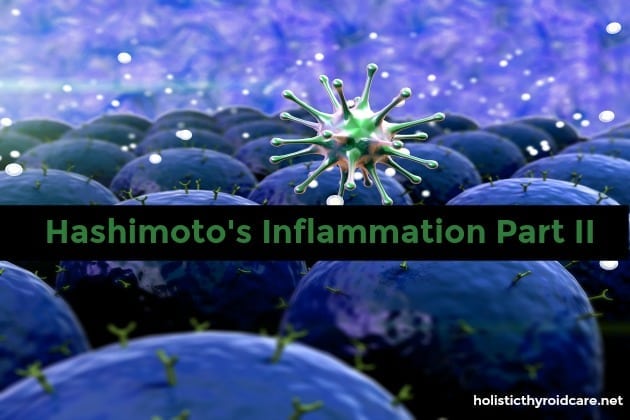
Chronic inflammation affects every aspect of your health and overall well-being. It can be mysterious at first, especially in Hashimoto’s. From where it begins, to the triggers, signs, and symptoms, it isn’t always straightforward to assess, much less address which is the main point. Inflammation must be addressed at its root. Unless you turn off the actual cause of the fire inside your body it is likely that a confused and chaotic immune system (firing out of control) is going to destroy more and more of your body’s tissue. You probably already know that the immune system primarily resides in the gut, specifically in the small intestine (which by the way in women can range anywhere from 15 to 32 feet in length!). So, it’s logical that the beginning point for an evaluation of potential factors and key triggers that promote an environment for chronic inflammation include the following:
- Stress: Emotional, physical, physiological: Examples include excessive worrying, over-reacting, Type-A personality, perfectionism, high expectations, over-exercising, surgical procedures, consuming mostly processed foods, low blood sugar, trauma, 24/7 inflammation due to autoimmune disease, fear, negative thinking and more. Reduced coping mechanisms for stress increases cortisol, epinephrine, norepinephrine & adrenaline and can eventually lead to burn-out and adrenal fatigue.
- Hormones: Thyroid, Estrogens, Progesterone & Testosterone: When any one of these hormone systems is out of balance, they’re all out of balance.
- Neurological: Traumatic Brain Injury (TBI), Cerebrovascular Accident (CVA), e.g. stroke, nerve degeneration.
- Infections: Candida, Bacterial Overgrowth, Viral or Parasitic Infection(s) and H-pylori.
- Medications: Antibiotics, Antacids, Corticosteroids, non-Steroidal Anti-inflammatory Drugs (NSAIDs.)
- Metabolic: Autoimmune disease, intestinal inflammation, end products of sugar metabolism (free radicals, etc.)
- Diet: Gluten, Soy, Dairy, Corn, Nightshades, Casein, Sugar, Trans-Fats, Feedlot-Raised Meat, Red Meat & Processed Meat, Alcohol, Refined Grains, Coffee, Artificial Food Additives/Food Colorings and Common Cooking Oils.
Blood testing is an additional tool you can use for assessing the degree to which you are inflamed:
- Homocysteine
- High Sensitivity C-reactive protein (hsCRP)
- Ferritin, TIBC, % Saturation, & Iron
- Sedimentation rate
- Whole blood histamine
- Triglycerides
If you want to do a little of your own investigation, you can self-order your own lab test requisition (very cost-effectively I might add) here.
Inflammation and Hashimoto’s
Several years ago my husband and I went on a cruise. Like most women, I couldn’t wait to book a little time in the spa. My goal was to do one of those wraps…you know, the kind that is supposed to eliminate cellulite. The spa was operated by a Swiss-based company and I was impressed by how educated the staff was about health.
As the specialist applied products and wraps to my buttocks, hips, and thighs I’ll never forget her saying “the status of your overall health depends on the health of your small intestine.” Although I appreciated the information, it was unsolicited. I suppose she was trying to tell me something and I related it to perhaps detoxing…to rid myself of cellulite. Today, however, I have a deeper understanding of what she said. I was inflamed and on the path to Hashimoto’s, I just didn’t know it yet. I’m not saying that cellulite practically all over my body was a sign, I’m sure it was one of many – and I’m sure she did her own sort of assessment.
Once inflammation is triggered and out of control, it can reach a level that actually breaks down the protective barrier in the intestinal walls and makes the gap junctions that hold things intact weak. This is the perfect storm for intestinal permeability, a/k/a “leaky gut.” We’ve all heard about leaky gut, right?
So, what this means is that if you have Hashimoto’s (or any other autoimmune illness), you likely have a leaky gut issue also. I certainly believe in healing and remission…the body was designed to heal and it starts with healing the gut. Food really does matter and it’s important for you to discover through testing which foods are causing inflammation in your unique body. Although many people do well by following a Paleo or Autoimmune Paleo lifestyle, the truth is there is no scientific research to definitively say that there is only one or two diets people with Hashimoto’s should be following. We are all bio-individual.
Although many people report doing well by following a Paleo or Autoimmune Paleo lifestyle, the truth is there is no scientific research to definitively say that there is only one or two diets people with Hashimoto’s should be following. We are all bio-individual and we should not be following a specific “food religion” without concrete data.
For food sensitivity testing, below are the tests I currently recommend:
- Cell Science Systems – ALCAT Platinum Plus Tests 237 foods, 50 functional foods, 20 food additives/colorings, 10 environmental chemicals, 20 molds, 20 antibiotics & anti-inflammatory agents.
- Cyrex Labs – Array # 3 – Wheat/Gluten Proteome Reactivity & Autoimmunity Panel
Hashimoto’s & Inflammatory Disease is on the Rise
Can you believe that 1 in 2 women are living with an autoimmune disease which is related to inflammation? Not to mention there are a lot of undiagnosed people still seeking answers. Even with all that is known about autoimmunity and why the body turns on itself, much of it is still a mystery and research is ongoing.
There definitely are things you can do starting today to calm inflammation in your body. If you missed my previous article on inflammation, please be sure to read Tips to Relieve Hashimoto’s Inflammation.
In addition, the tips below will also help get you started.
TAKE ACTION: Review the list below of potential triggers and remove any that apply to you. Specifically, you can accomplish the following:
- You have the power to adopt coping mechanisms for stress and practice them every day (10-15 minutes). Need ideas on how to reduce stress? Check out my self-care practices guide HERE.
- You can avoid over-exercising (to prevent excessive inflammation).
- You can maintain a stable blood sugar through healthy diet of non-inflammatory foods, healthy fats, & lean protein (to support the adrenals: low blood sugar triggers the release of cortisol for survival)
- You absolutely can work on how you react to stressful situations, although it does take practice (to reduce being in “fight/flight” mode which is inflammatory in and of itself).
- You can improve sleep quantity and sleep quality with commitment (this is when the immune system attempts to heal itself).
- You have the wisdom and capacity work on keeping a positive attitude, full of gratitude, love, and appreciation (promotes natural opioids to reduce autoimmune reactions & sends good vibes to the immune system to calm down).
- You can maintain an appropriate exercise and movement on a regular basis (not too much & not too little – more on this later)
- You have the ability to work on all the things that are within your control and accept the things you cannot change (at least for now).
- If you have not been tested for food sensitivities, now would be a good time to think about that. Regardless, you will want to remove the known inflammatory foods noted in the list. You can do this!
- Understand that healing Hashimoto’s is a journey…not a final destination. Please have patience and compassion for yourself and know that you are not alone!
References:
- Reiss, U. & Zucker, M. (2001). Natural hormone balance for women: Look younger, feel stronger, and live life with exuberance (p. 36-40). New York: Pocket Books.
- Shames, R. (2014, June 25). ZRT Laboratory Innovative lab testing made simple. Retrieved January 22, 2015, from http://www.zrtlab.com/three-legged-stool-webinar.
- VerHulst, D. (2009). Ten keys that cure: Bible truths for better health today. U.S.:
D. VerHulst.

